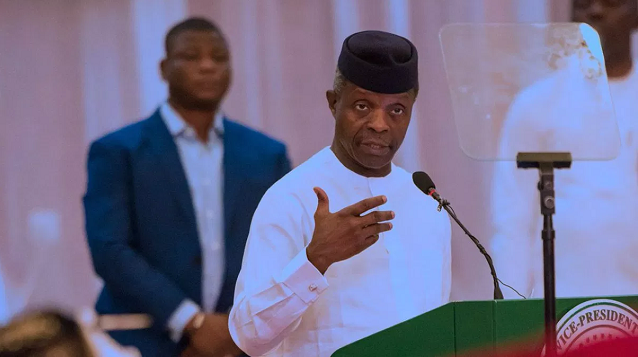COVID-19 has slowed growth in many nations, with Nigeria included, despite its narrow escape from recession. Vice President Osinbajo has stated that for Nigeria to move past the pandemic-induced crisis, the nation would need to place its focus on productivity and value addition.
Nigeria’s second citizen stated this at the Bank’s Chief Executive Officers (CEOs) Summit.
Also present at the event were the Governor of the Central Bank of Nigeria (CBN), and the governors of Lagos, Ekiti, and Bauchi states.
The VP said that regarding the subject of agriculture, the country should focus on processing raw materials, and the provision of employment through the creation of more values, as value chains “make more money”.
He also noted the importance of manufacturing, describing it as “key”. We said that Nigeria could become the “factory” for Africa.
Osinbajo said that there have been discussions on zero taxes for machinery because these machineries stimulate production.
The VP said, “Moving beyond the pandemic induced crisis, the first step in achieving sustained growth is to focus on productivity and value addition in every sector of our economy.
“For instance, in agriculture, our focus must be on processing of raw produce. Adding values means more jobs and the value chains make more money.
READ ALSO: Nigerian Women Face Constraints In Starting Businesses, Pension, Others
“Manufacturing is also key. We can be the factory for the continent. We’ve been discussing the prospects of zero taxes for machinery generally because machines mean production.
“In fact, the thinking of government generally is to make Nigeria a value-adding economy, especially in our areas of comparative advantage.
“And talking about comparative advantage, Nigeria must leverage its trading talents. We have some of the greatest traders and entrepreneurs in the world, such that we can become a global trading hub.”
Regarding the participation of the private sector, Osinbajo said, “The President has now approved the establishment of InfraCo which will be a public-private partnership chaired by the CBN Governor to overcome our infrastructural deficits.
“I expect that this is a project that will excite the interest of financiers and bankers and I encourage you all to lend support to make it a success.”
Osinbajo On Cryptocurrency
Touching on the still-controversial subject of cryprocurrency, he said, “On the very topical issue of blockchain technology, digital assets, and cryptocurrencies, let me say two things.
“First is that there is no question that blockchain technology generally and cryptocurrencies, in particular, will in the coming years challenge traditional banking, including reserve banking, in ways that we cannot yet imagine so we need to be prepared for that seismic shift.
READ ALSO: NBS: Prices Of Egg, Rice, Others Rose In January
“And it may come sooner than later. Already remittance systems are being challenged. Blockchain technology will provide far cheaper options for the kind of fees being paid today for cross-border transfers.
“Some reserve banks are already issuing their own digital currencies. Clearly, the future of money and finance, especially for traditional banking, must be as exciting as it is frightening.
“But as we have seen in many other sectors disruption makes room for efficiency and progress.
“Secondly, I fully appreciate the strong position of the CBN, SEC, and some of the anti-corruption agencies on the possible abuses of cryptocurrencies and their other well-articulated concerns.
“But I believe that their position should be the subject of further reflection.
“There is a role for regulation here. And it is in the place of both our monetary authorities and SEC to provide a robust regulatory regime that addresses these serious concerns without killing the goose that might lay the golden eggs.
“So, it should be thoughtful and knowledge-based regulation, not prohibition.”
Bank CEOs Present
Banks represented by their CEOs include, Access Banks’s Herbert Wigwe; GT Bank’s Segun Agbaja; Heritage Bank’s Ifie Sekibo; Kennedy Uzoka from UBA; Tomi Somefun of Unity Bank; Zenith Bank’s Ebenezar Onyeagwu; First Bank’s Adesola Adeduntan.
Others Include Ecobank’s Patrick Akinwuntan; Fidelity Bank’s Nneka Oyeayi-Ikpe; Standard Chartered Bank’s Lamin Manjang; Kayode Pitan of the Bank of Industry; FBNQuest Merchant Bank’s Kayode Akinkugbe; Jaiz Bank’s Hassan Usman, FCMB’s Yemisi Edun, Stanbic IBTC’s Wole Adeniyi, Nova Merchant Bank’s Nat Ude; and Benson Ogundeji of Greenwitch Merchant Bank.











